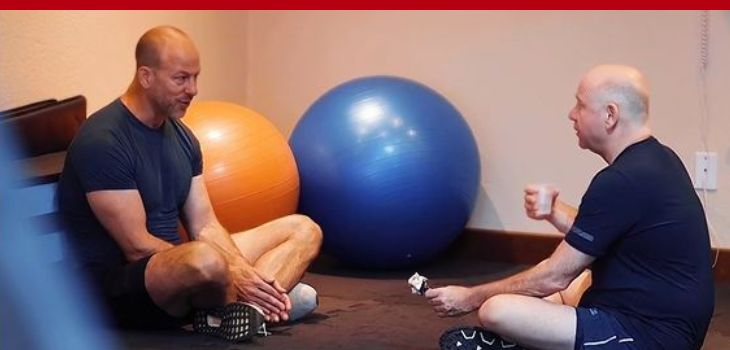by Ted Ryce
568: How to Become Unstoppable in 2024 Series: Part 1: Mastering Your Mindset: The Key to Lasting Body Transformation Success
by Ted Ryce
by Ted Ryce
568: How to Become Unstoppable in 2024 Series: Part 1: Mastering Your Mindset: The Key to Lasting Body Transformation Success
568: How to Become Unstoppable in 2024 Series: Part 1: Mastering Your Mindset: The Key to Lasting Body Transformation Success
more
by Ted Ryce
568: How to Become Unstoppable in 2024 Series: Part 1: Mastering Your Mindset: The Key to Lasting Body Transformation Success
As we wind down on this year and ramp up for the next one, a lot of us are going to want the next 12 months to be “better” than the last. But what does “better” mean to you?
If it means carving out more time in your day to focus on your health and fitness and finally making you a priority in your life, you are in the right place.
We created the “How To Become Unstoppable In 2024 Series”, to help you master the health and fitness game in 2024.
In the Intro episode, Ted talked about the profound impact of health and fitness in his life after the tragic loss of his mother and brother. He also shared how focusing on his health helped him regain his zest for life and reshape his vision for the future and how it can transform your life too.
>>> Click here to listen to the Intro
In Part 1, he dives into mindset—exploring how it totally shapes the way we deal with our health, wealth and legacy. He breaks down what mindset really means, why it’s key in our health journey, and the 5 mindset shifts you need to create a body transformation that lasts and to develop a longevity mindset. Listen now!
You’ll learn:
- What does mindset mean?
- Why is mindset important in your health and fitness journey?
- Why you should start doing things differently in different areas of your life
- Tools for navigating challenges and achieving personal growth
- The 5 mindset shifts you need to make to become unstoppable in 2024
- Knowing your numbers
- One size fails all
- Retraining your brain
- No one is coming to save you
- Knowing your “why”
- And much more…
Related Episodes:
Links Mentioned:
Join The Unstoppable After 40 Newsletter
Learn More About The Unstoppable After 40 Coaching Program
Schedule a 15-Minute Strategy Call with Me!
Watch My Body Breakthrough Masterclass
Ready to make 2024 your best year ever?
We just opened spots for our Unstoppable After 40 Coaching Program starting on January 4th.
Together, we’ll craft a personalized plan to reclaim your health and transform your body in a way that fits your busy lifestyle.
If you want to learn more about our program, click here!
We have limited spots, so don’t wait until January to book your call. Click here!
Podcast Transcription: How to Become Unstoppable in 2024 Series: Part 1: Mastering Your Mindset: The Key to Lasting Body Transformation Success
Ted Ryce: Welcome back to the New Year, New You series. Welcome back to the New You New Year series. I'm your host, Ted Ryce, and in case you're just tuning in for the first time, this is going to be a six-episode series about how to master your health in 2024.
So, if you haven't listened to the first episode, which is episode zero, it's my what you might call origin story. It's about how I got into health and fitness. And for me, there are missionaries and there are mercenaries in the health and fitness business.
And I share with you a very personal story about how I got into health and fitness, why I've chosen this field—or really, it's not even chosen, it's a calling for me. And I even share some news clips of the event that started everything for me. So, it's a deeply personal episode.
And if you're wondering, "Why do you do this, Ted? Is this just a way to make money for you? What are the deeper reasons why you're interested in having a business around health and fitness?" you want to listen to that previous episode. Now today, we're going to be talking about mastering your mindset for health. And I want to ask you:
When I say mastering your mindset for health, what comes up for you? I don't know about you, but when I first started hearing all this talk about mindset, I thought it was a bunch of BS. I'm not going to lie; I thought it was just nonsense talk. It's like, enough with the mindset talk. Just share the strategy, share the tactics, share what to do, so I can go and do it.
But here's the thing: I ended up not following through on so many of the things, so many of the tactics and strategies that I learned. And as I got older, as I matured, and as I saw my clients struggle with the same issues I was struggling with, I came around to this mindset idea.
And now, I believe it's the most important part of health or let's say the foundation. And before we go on, I want to define this term mindset because it's a term that's often thrown around, but a lot of people, they don't define it. It's just like, "Oh yeah, let's do mindset. Mindset is so important." There's even mindset coaches. Probably some are good. I have a feeling a lot aren't.
Anyway, so the working definition I want to use here is a habitual or characteristic mental attitude that determines how you will interpret and respond to situations. I'm going to say that again: a habitual or characteristic mental attitude that determines how you will interpret and respond to situations. You might ask, "Well, why is that important?" I know you said it was important, and you said it's the most important thing, but why?
Well, let me ask you these questions: Do you have a growing waistline? Are you a few months or even a year or more behind on blood work? Do you have any idea what your body fat percentage is, because you haven't done a body fat percentage test in a long time or maybe you've never done one? And do you start and stop diets? Have you lost weight 20 times? Have you lost the same 20 pounds 20 times and then gained it back again?
These are mindset issues, ultimately. And I know you might be saying, "No, it's not, it's the hormones, it's the chemicals in the food, it's the menopause, it's the andropause, it's the low T," it's whatever you might say, but I'll tell you, I don't believe that. I believe it's a mindset issue.
Now, I'm not asking you to believe me, but I'm asking you to listen and to challenge yourself. So, let's dive in.
Mindset number one, know your numbers. I believe the future of health is data-driven. And one of the reasons why so many people fail with their health is because they don't understand the data. They don't get the proper metrics and measure them over time. And that's exactly what we do in my coaching program. And it's one of the keys to getting great results.
So, do you know your body fat percentage, your lean muscle mass? Do you know how much visceral fat you have? What about lab tests? When's the last time you got a full workup on your health? Do you know your testosterone level?
Your thyroid panel, have you ever had a thyroid panel? Do you know what your fasting glucose is? Or your hemoglobin A1C, your C peptide? Or CGG? There are so many metrics with blood that we can look at and say, "Hey, listen. You're not as healthy as you think." And so many people are living in denial about the state of their health.
But let me tell you, I've seen that shift on a dime or turn on a dime, whatever the expression is, when people get their data. I actually had an individual tell me, "You know, I'm pretty good. I mean, I'm on blood pressure medication and on cholesterol medication and another medication and I'm about 60 pounds overweight, I'm obese.
My energy level is kind of low and my brain fog gets in the way sometimes, but yeah, I'm pretty healthy." No, you're not, at all. So terrible.
But when you get the data, it's a wakeup call. And when you compare yourself to an objective standard, for example, we know what your body fat more or less should be.
We know what your muscle mass should be. We at least have an idea. We know what your visceral fat should be. And this changes everything. One of the issues is that doctors aren't testing for a lot of this stuff. And I think there are numerous reasons why this is happening.
One, doctors are unhealthy themselves. A lot of doctors are maybe getting away from some of the data as well. They're very busy. I had a client recently; he had high ferritin levels. And the only thing that this particular doctor said about the high ferritin levels is, "Oh, yeah, you probably don't have iron deficiency." It's like, dude, it took me—I'm not a doctor.
But it took me about two minutes to do a literature search to find out that high ferritin levels are a result of, or the most common reason, sometimes it is high iron.
But the most common reasons, according to the evidence, is obesity, fatty liver, and alcohol consumption. And this particular client, he was not in a healthy place. Now he's lost, now he's on the path, on a better path, let's say, but he was not in a good place.
I had another client whose doctor didn't even test him for A1C. And when we did the A1C test, he came back as pre-diabetic according to the reference ranges. And when he saw that, he got very motivated to change his health. Very motivated. So, know your numbers.
And beyond body fat percentage, muscle mass, visceral fat, and key lab tests, we can also use wearables for monitoring health. We can use health indicators like heart rate variability, resting heart rate, sleep quality. Now, with resting heart rate and heart rate variability, those are measures of internal stress. It's something I use every day to decide, "Okay, what do I need to focus on today?"
And we can measure sleep quality, not just how long you sleep, but what is the quality of that sleep, like sleep efficiency out of the time that you were in bed, how much of that time were you actually asleep? Because when you wear something like an Oura ring, like I do, you realize you wake up often more often than you think. That's an issue.
So, know your numbers. The next mindset is: One size fits all is a failing strategy. So, there's that talk, or that term, one size fits all, but what I think about: one size fails all. And this is the issue: fad diets, cookie-cutter workout programs—5x5 strong lifts, P90X—those things work when they work. But if you don't understand how to change them to make them work as your schedule changes, you just stop doing it. Same thing.
So many people have signed up to my coaching program. "Well, I did keto and intermittent fasting, but you know, the intermittent fasting, I just kind of gave up on it. And the keto was really hard to keep up during the holidays and on business trips. So I gave up on that too." Why do you give up on things? It's because you're trying to fit yourself to the diet or the workout program, instead of trying to fit the diet or workout program to you, your life, and your preferences. It's a recipe for failure.
And it's one of the ways that I get such great results with clients. People are always wondering like, "What's the magic here? What's the, how are you able to get such great results with your clients?" Well, first, I optimize for consistency because if you can't be consistent, then you can't get results. Or at least you can't get results and maintain results. And certainly, you can't get great results without showing up.
So, I work with my clients, just like you might iterate in your business, I work with my clients and iterate their nutrition or iterate their workout programs until we have things dialed in. Yes, it's not as simple as following a diet that's all mapped out for you with a list of foods to eat and foods not to eat. So, it takes longer to do and it's got, let's say, a level of skill acquisition involved, but it lasts.
So, the future paradigm here is personalized health strategies. Stop doing the one size fits all stuff. Those are quick fixes. And if you can't see yourself doing something for at least a year, and really 10 years, then it's just not the right strategy for you.
Mindset number three: Retrain your brain. Wow, when you talk to people about why they're not in better shape, they have so many stories: too busy, I like food too much, I'm just not an exercise person. It's like, well, you weren't a tennis playing person or a golf playing person when you were born. What happened?
Well, you started playing, you got lessons, you liked it, you kept with it and now it's part of your life. What about driving a car? Were you a car-driving person when you were born? You didn't even speak a language. And if you're listening to me, you're an English-speaking person. And there was a time where you didn't speak at all. And if you think about this, the only reason that you speak English is because you were born in an English-speaking country or in a country that emphasized learning English.
Where am I going with this? Because while there might be a core of your core values, and for example, a core value for me is integrity. Another core value for me is family. Another core value is making positive change in the world and being the best version, because I believe that's the way to make the world a better place.
So, those core values don't change, but this other stuff it can change. And the way that our personality changes or that our identity really changes is when our brain changes. I'll give a personal example here. I wasn't a Brazilian Jiu Jitsu person. I had never done it until when I was 28 years old. And when I started it, I was terrible.
But now I'm quite good. I'm almost a black belt and it's part of my identity part of what I'm into. I'm into that culture. I can have a conversation about it. I understand things about it. I have philosophical beliefs about jiu jitsu.
Now you may not be interested in that, but it's just an example. In fact, one of the things that I look for in my clients is when they start telling me that they're doing something different.
For example, I have a great, one of the best body transformations that our program has ever produced. Dan Gray, the divorce attorney, you've probably seen him in my masterclass or heard his testimonial here. And he said about six to seven months in the program, he spent a year in my group program and lost 56 pounds. He started saying, "Well, I found myself doing things automatically without thinking too much about them." That's what we're talking about, that automaticity.
But you got to stay with it until it happens. Another thing Dan said is he started doing other things differently outside health and fitness. For example, he told me that he took a last-minute trip to Spain and it's something he'd never do until he joined my program.
Because one of the things that I tell people to do, and this is a little bit of a tangent, but I think it's important, I tell people start doing things differently. This is not about diet and exercise. This is about shifting your identity, expanding yourself. It's not about asking, "How can I lose 30 pounds and keep it off?" It's who do I need to become to lose 30 pounds and keep it off without even trying?
So, we're talking about neuroplasticity and habit formation. That's how we change over time. That's how you learn new skills. This is about retraining your brain as much as diet, exercise, sleep, and everything else that we've talked about.
Number four mindset: No one is coming to save you. You must take personal responsibility here. You can't just go to the doctor. Everybody loves to blame doctors, but doctors are having a tough time. I have and had and still have, actually I'm not working with any doctors at the moment, but I've had so many doctor clients. Starting 24 years ago when I was a personal trainer.
Doctors are under a lot of stress. They work long hours and there's a lot of unhealthy practices in medicine, like in residency. These guys don't sleep. So anyway, your doctor is having their own challenge. And medicine is in a bit of a crisis. And let me ask you this. Doctors, people say so many bad things about them.
I mean, I haven't asked, but I would imagine if I was a doctor and hearing that, like, 'You're just like, oh man, whatever with you guys.' Another thing that a doctor, my most recent doctor client, told me: he's like, 'I see a lot of people. They come to me for help, but it's really kind of too late. And what they really needed was someone for them, someone to help them change their behavior. And that's not what doctors do.'
We must take personal responsibility. Now, I think the paradigm of medicine is changing. Well, it's always changing. It's changing faster than ever, but you can't wait for that. You got to take responsibility now. There is no right time. The right time was 10 years ago or yesterday or whatever. It's in the past. Second best time is right now.
There is no, there is, once you let some damage build up, there's no coming back from that. You pay the price eventually. And I say that not to bring you down and say, 'Oh, well, you know, it's too late for me.'
It's never too late. It becomes more important. Focusing on your health becomes more important as you get older. And if you've made it to your 40s, 50s, 60s, and you haven't taken great care, well, then you're still doing well and you still have, if you're still walking about, you're still breathing, you can still go to the gym, you can still control your choices. You can take personal responsibility. You can make this happen. But you must commit to taking personal responsibility.
And the last mindset is know your why. Cliché, yes. And very true. One of the things that we do in my coaching program, I have clients do, let's say, a 'know your why' exercise. We call it the 'heaven and the hell.'
And it's exactly to get clear, or help our clients get clear on what is the motivation, the deeper motivation driving you, why is this so important? Why do I want to lose five pounds, or actually it's never five pounds. I want to lose weight, 20 pounds. Okay, great, why? Well, I'm not fitting into my clothes. Okay, why is fitting into your clothes important?
Well, it kind of makes me feel bad that I have all these clothes in my closet and they're kind of expensive and I can't even wear them, can't even fit into them. And I feel like I'm going in the wrong direction. I was like, why does that matter? Why is going in the wrong direction matter?
Well, I feel like I'm losing my edge. I feel like I'm on the verge of a midlife crisis. I feel like I've worked so hard and built so much financial success and I've given everything, I've given so much of myself to build the financial success and for my family, but I feel like I left myself behind. And I'm not feeling good anymore.
And I want to feel good because it's affecting me as a parent. It's affecting me as a partner for my spouse, it's affecting my ability to feel good on a day-to-day basis and I can't live this way anymore. Boom, now we're in business. I want to contrast that. I had some person tell me, 'Well, I want to look like Captain America.'
And I try to dig deeper and they're just, either there wasn't a deeper reason for this person, or he wasn't willing to share, but I was just like, this is not a person who's going to do well in my coaching program. And I ended up talking him out of joining.
I was like, to be honest, with your schedule looking like how you want to look like, it's going to be super hard to achieve your goal and you're traveling a lot. I don't think I'm going to be able to help you with it, to be honest and I talked him out of joining.
So, you must understand your why and it's got to be deeper than wanting to look a certain way. Well, it can be you want to look a certain way, but you need to know why that's important. I want to look a certain way, but I know why it's important to me. I don't want to feel old. I don't want to look like my dad. I love my dad, but I don't want to go the path that he went.
And this also reminds me of that famous Nietzsche quote, that “he who has a why to live can bear almost any how”. And when we understand our why, we're able to take action, the action that we need to take, because I'll be honest with you, transforming your body, it's sexy to talk about, the photos, the before and afters are sexy, but this is a major change, a major shift.
And I think it is for everyone, but not everyone is in the right frame of mind to do it. You really have to have that strong desire to change and understand why you want to change. And then that can get you through the tough moments.
So, let's do a brief recap then wrap things up. So, mindset, it's the habitual or characteristic mental attitude that determines how you will interpret and respond to situations.
So, one is knowing your numbers, because when you know your numbers, you're telling yourself, 'Look, this is not how I feel. Facts don't care about my feelings. I need to go with the facts and I might feel good, but these indicators are the reality of my health.'
Mindset number two, one size fails all. You must have a personalized approach that is flexible in nature so that it changes as the quarters change for you or as the seasons change. And let me tell you, I get clients working with me for a year because I want to see how they do in every season, every quarter. Then we can see, okay, because you might crush it in quarter one, do poorly in quarter two, crush it again in quarter three.
It's always variable. It's always so fascinating to see, but one size fails all. You must have a personalized strategy.
Mindset number three, retrain your brain. This is about reprogramming yourself. And you must be consistent to reprogram yourself, to retrain your brain. And when we're talking about retraining your brain, we're talking about the concept of neuroplasticity and habit formation, and you must stay with these habits until they're automatic.
Mindset number four, no one is coming to save you. You must take personal responsibility. Not a popular thing to say these days.
And mindset number five, you must know your why. Because it will be a challenge to change. And if you're not clear on why it's important to you, you will give up.
So, I want to ask you, which one of these hit home for you? Or what is the lesson that you can take away from this episode and start applying in your life?
And if you want to share with me, I would love to hear from you. Reach out to me on Twitter or Instagram @ted_ryce.
So, thanks so much for tuning in, our next segment is going to be on exercise. I'm going to share with you not just the science of exercise, but also how I'm looking at it for long-term health optimization, for longevity. What do we need to think about for, or take action on to be in shape in our 50s, 60s, 70s, 80s, 90s, 100s, however long we're going to be alive.
And if you're interested in exercise and what I'm onto, what I'm doing to be in the best shape of my life for the rest of my life, despite the fact that I'm 46, about to turn 47, you're going to want to tune into that next episode.
Hope you're enjoying this series so far. Have a great one and speak to you soon.
Sign up to receive email updates
Enter your name and email address below and I'll send you periodic updates about the podcast.









